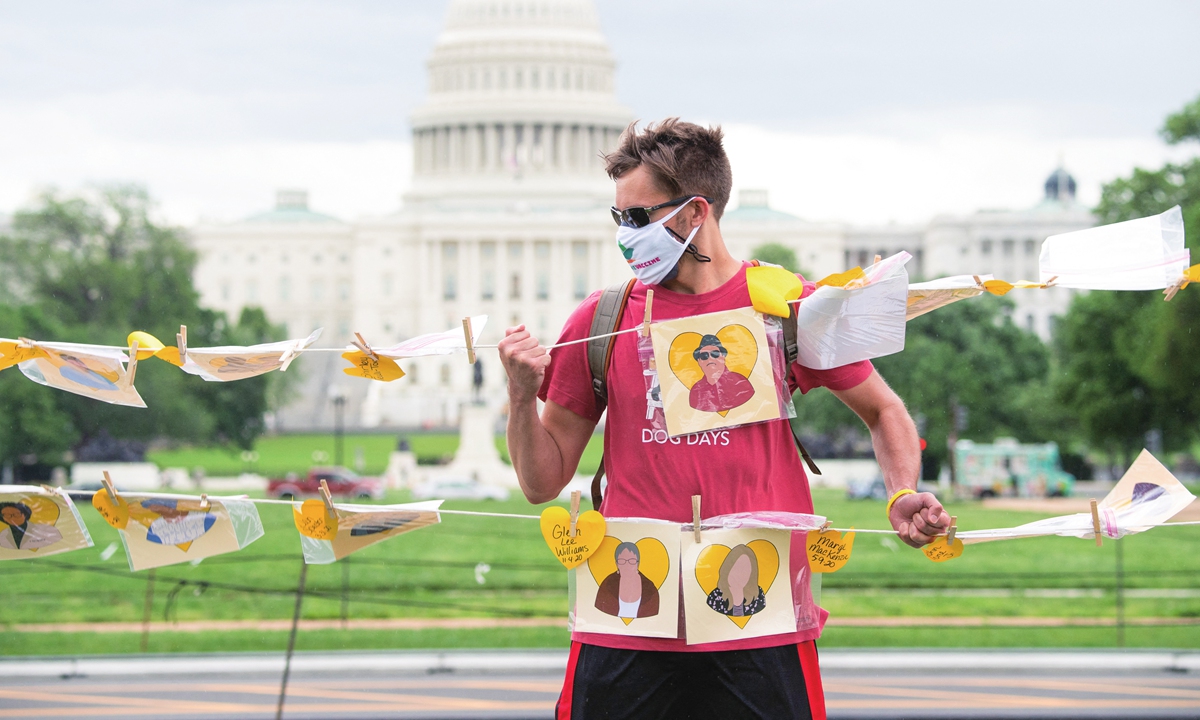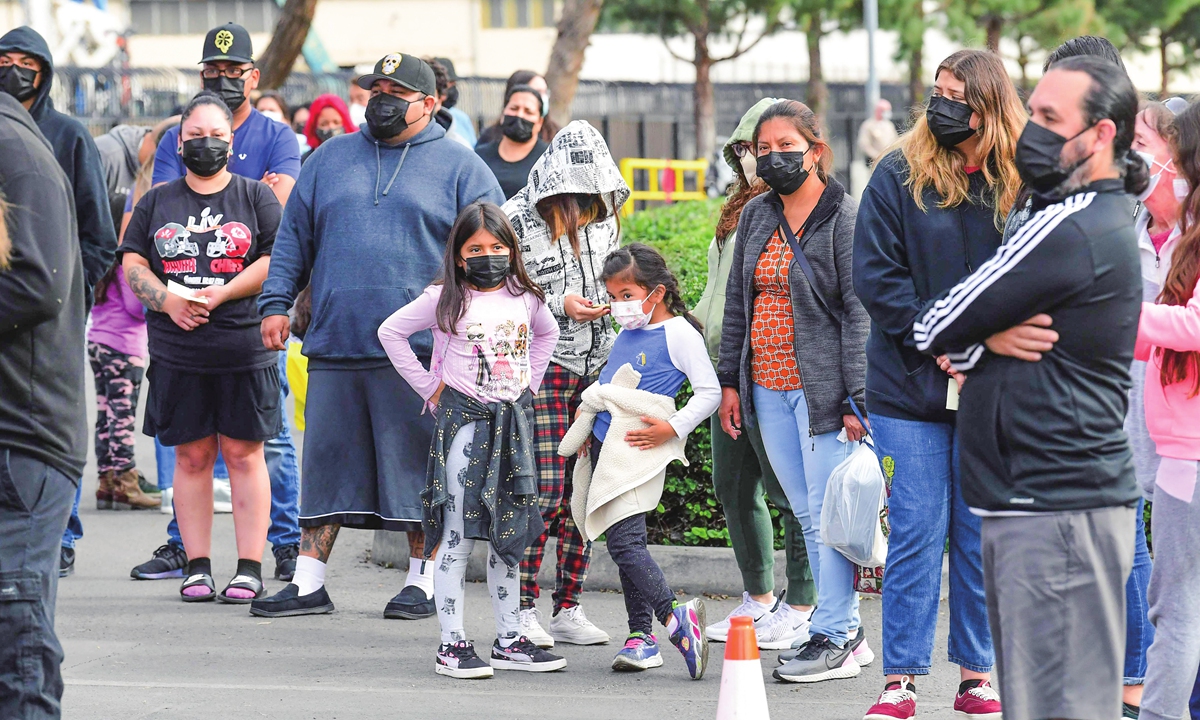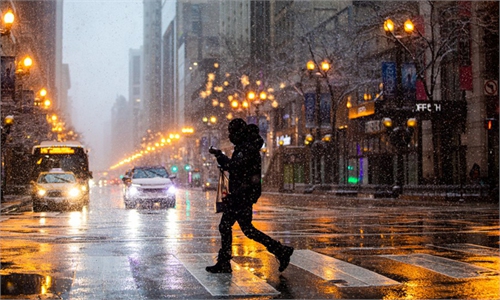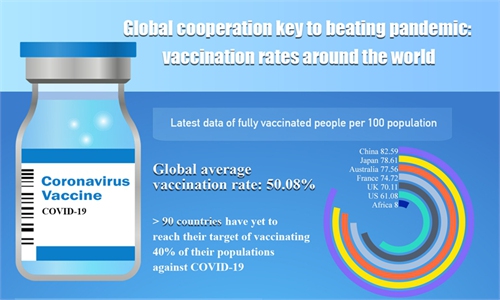US politicians make a fortune out of health crisis in a system upholding their privilege
Pandemic cash cow

A man fights with the wind as he holds up a memorial to those who died of COVID-19 on the National Mall in Washington DC on May 5, 2021. Photo: VCG
At a time of a national COVID-19 crisis, a number of US officials have been revealed to have cashed in on the epidemic by insider trading while concealing vital epidemic information from the public.
This, experts said, has contributed to the increasingly bleak national landscape, as President Joe Biden marks one year in office.
US media has reported that multiple US senators have acted on inside information about the COVID-19 pandemic, selling stocks in an expectation of a crash but giving no warning to the public about the dangers presented by the virus, or even continuing to play down its impact. This has caused public anger nationwide, evident in ongoing petitions calling for thorough investigation and serious punishment accordingly. As of January 18, 2022, there were a total 64,720,612 confirmed cases of COVID-19 and 843,718 deaths in the US. Since the New Year, an omicron surge has seen daily confirmed cases surpass 1 million in the country in just several days.
The bungled epidemic fight in the US has much to do with the irresponsible approach and flawed policies by the US government and its officials, Li Haidong, a professor at the Institute of International Relations at the China Foreign Affairs University, pointed out.
While other countries are busy saving lives amid the pandemic, many US lawmakers are busy making a fortune by taking advantage of their privileges in handling the domestic epidemic, Li said.
US citizens and some organizations have initiated an ongoing petition calling for thorough investigations into suspected senators to hold them accountable.
This is not the first time US officials' profit-making scandals during the epidemic have come to light. In July 2020, Trump associates and members of his administration were revealed to have received millions in loans from coronavirus disease bailout.
Observers said that unpunished US senators who trade on and make profit from insider information exposed the hypocrisy of American elected officials.
"Through propaganda, the US has created the illusion that elected officials will always put people's interests first and serve them. The US pretends that their democratic political system is the most effective by means of maintaining incorruptibility, but it turns out that they have simply designed a system to legitimize corruption," Shen Yi, a professor at the School of International Relations and Public Affairs at Fudan University, told the Global Times.
This shows that these lawmakers, in their positions of power and paying lip service to "morality," "human rights," and "democracy," are only eager to maintain their power and use it to gain personal benefits, Li said.
How to profit from epidemic
Thirteen US federal lawmakers have been named for allegedly violating the Stop Trading on Congressional Knowledge Act - or STOCK Act - by failing to properly disclose their financial dealings, US media outlets reported recently. The lawmakers - five Democrats and eight Republicans - were named in an investigation by the Business Insider.
Insiders and media sources identified the US congressmen who traded on insider information over the past two years, which may have broken the STOCK Act that prohibits lawmakers from trading on "nonpublic" information. The law was designed to force lawmakers to be more transparent about their personal financial dealings.
Some of these politicians are anti-China vanguards, who have repeatedly and publicly criticized China over the so-called human rights violations, while domestically, they have profited greatly from the US' catastrophic epidemic tragedy.
An additional 116 lawmakers were rated as "borderline" by Business Insider's investigation, meaning that their financial dealings were judged to be in need of further scrutiny. Separately, the Business Insider reported that 75 lawmakers traded stocks in companies that make COVID-19 vaccines, treatments, or tests as the epidemic spanned over the past two years.

Staff members take photos of a puppy on a podium before a press conference by US Senator Rand Paul in Washington DC on October 7, 2021. Photo: AFP
Among them, Rand Paul, a Republican from Kentucky, was 16 months late in disclosing that his wife bought stock in a biopharmaceutical company that manufactures an antiviral COVID-19 treatment, the Washington Post reported.
Representative Tom Malinowski, a Democrat from New Jersey, is one of the 13 members of Congress rated by the Business Insider under "danger", to include those who have violated the STOCK Act by failing to properly disclose financial dealings to a significant degree.
Malinowski reportedly violated the STOCK Act 145 times totaling at least $845,000.
Malinowski's stock-trade frequency peaked in March 2020 as the COVID-19 epidemic gripped the US and caused the stock market to plummet. One stock sale that month involved the shares of a medical-diagnostics company that manufactures COVID-19 tests.
This US lawmaker has long been supporting "Hong Kong separatists" and smearing China on so-called human rights issues.
Malinowski introduced bipartisan legislation which was passed by the House on December 7, 2020 to provide "refuge" in the US to Hong Kong separatists in the name of "democratic freedoms." In July 2020, the House passed Malinowski's bipartisan amendment to prohibit American companies from exporting products and services to China that could be used to commit the so-called "human rights abuses, including against China's Uygur minority." Even in June 2021 Malinowski introduced a resolution urging the International Olympic Committee to change the venue for the Beijing 2022 Winter Olympics "unless the Chinese government ends its ongoing crimes against the Uygur people."
It remains unknown so far if Paul have paid due fines under the STOCK Act. Malinowski has also failed to provide proof that he has paid any applicable fines under the STOCK Act.
Business Insider reported that while lawmakers who violate the STOCK Act face a fine, the penalty is usually small - $200 is the standard amount - that can be waived by House or Senate ethics officials. Ethics watchdogs and even some members of Congress have called for stricter penalties or even an outright ban on federal lawmakers from trading individual stocks, although neither has come to pass.
With increasing anger, US organizations and citizens have initiated an ongoing petition calling for a thorough investigation of these US officials who sold off millions in stocks just before the market crashed in response to COVID-19.
"Profiting off of a pandemic is despicable. If the allegations are true, instead of serving the American people in a moment of crisis - these senators exploited their positions to enrich and protect themselves," said the petition letter, which was sponsored by several US organizations including American Family Voices and USAUnify on the website of Action Network. "And if these senators did in fact engage in insider trading, they must resign."
Similarly, in July 2020, data released by the Small Business Administration showed that companies associated with former US president Donald Trump and members of his administration benefited from pandemic relief programs, raising questions about the equitability and distribution of small-business loans, and revealing that US officials' "mismanagement" and "malpractices" were indeed pervasive amid the epidemic.
These politicians are squeezing value out of disaster and making a fortune from the pandemic. That's how they maintain their power - amercing wealth by exploiting any advantage and using their power bestowed upon them by the citizenry, said Shen. "The fact that these people are not being held accountable shows that many of the laws in the US are designed to serve their privilege."
Sharp institutional contrast
In the US, which touts itself as an advanced country under the rule of law, the politicians who violated the STOCK Act did not face any severe punishment and many even continued to remain in their positions unchallenged.
"This reflects the loopholes in US laws and in relevant policies. It brings to light the corruption of the US government and the moral bankruptcy of its officials, in stark contrast to China's response to the epidemic," according to Li.

People wait in line for a COVID-19 test in Los Angeles, California, on January 12, 2022. Photo: VCG
In China, it is very clear who should be punished if they fail to handle the COVID-19 outbreak properly, but in the US, it is a circus, which truly shows how surprisingly low the quality of political integrity or democracy in the US is, said the expert.Under the coordination of the central government, Chinese officials of all levels continue to play a leading role in the effective fight against the epidemic, via creative ways such as introducing anti-epidemic rules through live-streaming and even folk songs.
And if serious mistakes occur during the fight, the relevant officials are held accountable.
In August 2021, 36 officials in Jiangsu, Hunan and Shandong provinces were held accountable in a single week; between July 20 and August 10, 2021, more than 40 officials in several areas were held accountable for poor epidemic prevention and control, and were punished according to law.
They were punished mostly for inadequate supervision and management, improper command, or dereliction of duty.
In contrast, the lackadaisical approach and general incompetence of US officials throughout the response to the epidemic has been on full display, and the persistence of many officials in cashing in on the epidemic can explain why the US is still in hot water when it comes to the outbreak, according to Li.
The fact that US laws and politics safeguard the interests of the rich and politically privileged groups, rather than the interests of the citizenry has been exposed, and "Malinowski was neither the first nor the last to amerce wealth amid the outbreak," he said.





